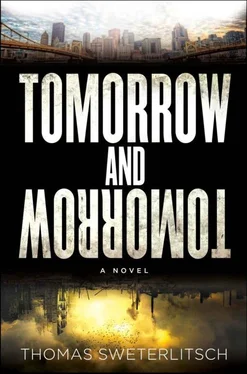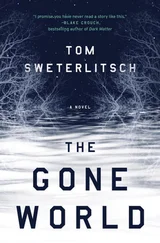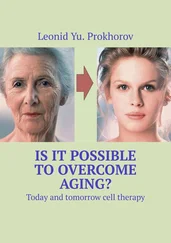There is a certain pleasure I take in this work—the speed it takes to find my query, the forethought needed to cover every angle. Naked and bundled under comforters, my ceiling gridded with coupons and logos, Café de Coral , Ben’s Chili Bowl , Little Sheep Mongolian Hot Pot , the streams flash President Meecham’s beach body, spring break wet T-shirt sex, the Madonna Centennial, a new slate of Japanese hard-core torture games—but the streams dissipate as I slip back through the heart of the City.
Polish Hill. The Immaculate Heart of Mary Church. Hillsides coppered with autumn leaves and crosshatched by dream-twisted narrow streets, alleyways, forks and switchbacks, the Immaculate Heart’s green domes and cream brick facade surrounded by ramshackle row houses faded, sagging, worn. Gooski’s is nearby, flashing neon Duquesne Pilsener ads in grime-streaked windows. Albion lived here at the end—down on Dobson, 3138, third floor. Layering, the soaked-clothes damp of drizzle and wind. Polish Hill was one of the artist enclaves by the end, artists too poor to afford the gentrified properties down in Lawrenceville so they moved up the hill, buying cheap properties no longer needed by the dying last remnants of the neighborhood’s original stock, generations of Pittsburgh families with Old Europe still in their blood. Art spaces, open studios, cheap bar after cheap bar.
Albion’s building is a corner property, boarded windows tagged with stenciled graffiti of lingerie models who have the heads of pigs. The door’s password protected, its green paint flecked and scraped revealing rotten original wood and rusted hinges. Rainwater puddles at my shoes. Override with the Archive code and I’m in—so Waverly’s right, Kucenic left my old codes active. A dank lobby. Piles of unopened mail scattered on the stairs and window ledges. Tags hover in the foreground and I scroll through the tenants that had lived here before the end—there aren’t many, but Albion’s not listed among them. The stairs are bowed, the walls blue with several coats of rancid paint that sweats and glistens in what little light there is. I’m out of breath climbing the two flights of stairs. Dates of Albion’s lease—her door’s also password protected, but before I can enter the override code, I hear the dead bolts falling away, the chains, and a young woman opens the door, an Asian woman. She looks as if she’s readying herself for a night out, her mantis-green dress unzipped at the back. She’s holding the front of her dress to her breasts, barely concealing herself, her shoulders bare. She’s lovely, and I stammer for something to say. She looks at me as if she were expecting someone else.
“I’m sorry,” I tell her, without thinking.
“John Dominic Blaxton,” she says, recognition dawning over her. “Focal Networks—”
“I’m sorry?”
She smiles—her profile’s blank. “You live in the public housing in Columbia Heights. Room R-17. Washington, DC—a temporary residence, previously of Pittsburgh and Virginia. Husband of Theresa Marie Blaxton. No children—”
“Excuse me?”
“You aren’t welcome here,” she says, shutting the door. I enter the archival override code and the door opens, what should have been Albion’s door, but the space is empty now—a small apartment, just a one bedroom, with one corner converted for use as a kitchen. The floor is unfinished hardwood. The walls are a generic cream, even the light fixtures are painted over. There’s no furniture here. There’s no woman. There’s nothing here.
“Hello?” My voice echoes in the empty room.
“Was this a dream?” asks Timothy.
“Parts of it were a dream, but I’m not sure what was real—”
Timothy’s office is cluttered, unlike Simka’s—stacked papers overflowing from plastic bins, bookshelves piled with true crime paperbacks and sets of leather-bound reference works, the DSM-IX in multiple volumes, dictionaries, thesauruses. His desk is clean, only a blotter, a pen and a leather-bound Bible. The chairs are mid-last-century, set around his desk as if for a meeting.
“Would you like some coffee? A drink?”
“I’d love some coffee—”
“I worry talk therapy will be counterproductive,” says Timothy. “When I look at the improvement you’ve made in this short amount of time—with a support system, supervised immersion, no drugs—it’s inspiring. Dominic, I don’t want you to identify yourself as someone who’s sick, as someone who needs to talk to a therapist. That sort of self-identification can often create problems. That’s not who you can become. Dominic, you’re healthy—”
An identity issue, he tells me. If I think that I’m sick, I will be sick. If I think I’m well, I will become well. Timothy believes in positive thinking—that physical health follows the belief of physical health, that the power of the spirit can heal the body. He tiptoes around calling his system the “power of prayer” but he quotes studies and clinical trials stating that God helps recovery much more effectively than medication. What is your identity? he asks. Do you want to be ill? Or do you want to be healthy? Who are you?
“How did you start working in the Archive?” he asks. “Were you always interested in this kind of work?”
“I was still thinking of pursuing my graduate studies after Pittsburgh,” I tell him. “Everyone was very accepting of survivors—it was easy to transfer programs. I chose the University of Virginia, moved to Charlottesville. I’d been studying Klimt and Schnitzler and Freud—”
“You aren’t a graduate student now?”
“No. Not anymore—”
“Why give it up?”
“Why?” I wonder. “Truthfully, I was already giving up on that sort of work years before. I think I know the exact moment I gave up—in my second year of classes at Carnegie Mellon, I presented a paper about Lacan. The shifting nature of desire. I showed projections of Egon Schiele’s work, some of the more pornographic stuff, and theorized in front of the class about female masturbation. I was beginning to think of myself as a sort of intellectual provocateur of the department—”
“You’re cringing,” says Timothy.
“I’m still embarrassed,” I tell him, “even after all these years, I’m still embarrassed. I used to wear a bowler hat, if you can believe that. So, there was a woman in class with me, she—I remember she used to be a ballerina, a real, professional dancer, but gave it up for French theory. After my presentation about Lacan, I was cutting across campus and she called out to me. I remember what she was wearing—this gingham dress. She told me how excited she was that I had talked about Schiele, that Schiele was one of her favorite artists. She said our areas of research were strikingly similar and she wanted to talk with me more about it. She invited me to dinner at her apartment. She said she was an excellent cook and told me that she had invested in a catalogue raisonné of Schiele with giclée reproductions of his work, but she didn’t know anyone else who might appreciate it. I was—actually, I was terrified of her. I’d always been intimidated in classes with her because she seemed to understand all the readings we were assigned. I didn’t think I could legitimately spend more than five minutes talking to her without exposing myself as a fraud. I didn’t know much about Lacan other than a few essays I’d read. Derrida was incomprehensible to me. I couldn’t figure out Bourdieu. I mispronounced all their names. I’d never bothered to read Foucault. She’d left the top few buttons of her dress undone so you could see the edge of her bra—this black, lacy thing. Imagining her apartment, imagining all the dog-eared paperbacks of theory and philosophy I knew she must have read, imagining sitting next to her looking at Schiele, the book spread open across her legs, scared me. I felt like she was playing a very adult game with me. She was very attractive, very intimidating. After that afternoon I felt like a poseur, studying Freud and Schnitzler. Schiele, for Christ’s sake. I never took her up on her offer. I stopped wearing my bowler—”
Читать дальше



![Том Светерлич - Завтра вновь и вновь [litres]](/books/401288/tom-sveterlich-zavtra-vnov-i-vnov-litres-thumb.webp)
![Том Светерлич - Исчезнувший мир [litres]](/books/420722/tom-sveterlich-ischeznuvshij-mir-litres-thumb.webp)







